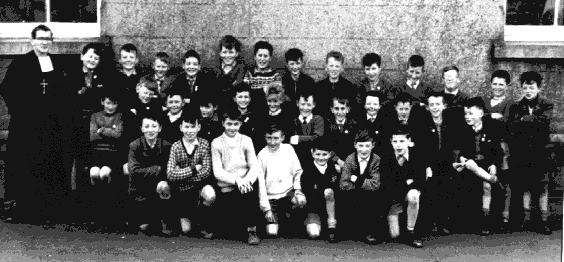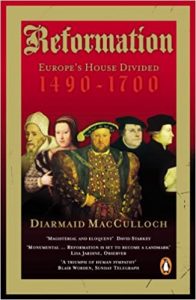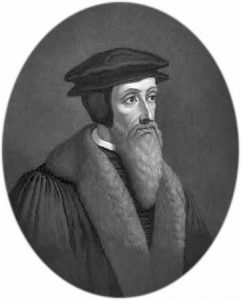I grew up in Castlerea in north Roscommon in the 1950s and 1960s. It was mono-culturally Irish Catholic to an extant almost impossible to imagine now.

We were very tolerant of Protestants, though, because there weren’t any. In their absence we had to dream them up. As I recall, in the Irish Catholic mind of that era there were basically two templates, the harmless ones, usually on horseback, and Black Prods, generally found Up North. Only the Black ones were liable to bite.
What brought this all to mind is a book I’ve just finished, Reformation: Europe‘s House Divided 1490-1700 (Penguin 2004), by Diarmud McCulloch. It’s an astonishing work, a detailed region-by-region, controversy-by-controversy account of how Europe (and Castlerea) divided into Papists, Beige Prods and Black Prods. The depth of my ignorance about the Reformation was jaw-dropping. I suspect that was one of the aims of a traditional Irish Catholic education.
It’s an astonishing work, a detailed region-by-region, controversy-by-controversy account of how Europe (and Castlerea) divided into Papists, Beige Prods and Black Prods. The depth of my ignorance about the Reformation was jaw-dropping. I suspect that was one of the aims of a traditional Irish Catholic education.
As McCulloch tells it, Martin Luther’s original rebellion had as much to do with local German politics and questions of political authority as with theology. Lutheranism became rooted in German-speaking areas of the Holy Roman Empire and in Scandinavia, in states where local kings or prince-bishops supported it and made the clergy state employees. It retained much of the liturgical tradition of the pre-Reformation Church.

The “Reformed” Church was very different. Following such leaders as John Calvin, it broke much more completely with the existing Church. In particular it stressed predestination, the idea that redemption is purely the gift of God and He (always a “He”) has chosen from the beginning of time those who will be saved. The “elect” can only contaminate themselves by contact with the pre-damned majority, a notion that sits uneasily with the injunction to love thy neighbour, unless of course you redefine “neighbour” to mean only other members of the elect. To put it another way, the Black ones were liable to bite.
In England, the split from Rome was originally entirely about political authority. Under the Tudors and the Stuarts, the Church of England (and Ireland) evolved into a hybrid state church, retaining some aspects of Rome, bishops in particular. Hence “Episcopalianism”, from episcopus, a bishop. Ultimate power derived from the monarch, though. To the Reformed, such a mash-up was anathema: Cromwell and the wars of the 1640s were the outcome. The ultimate victory of the hybrid Anglican state church in the 1690s (after William of Orange invaded England) was defeat for the Reformed, whatever the marching bands in Larne on July 12th might proclaim.
Like all great books, Reformation casts light in all sorts of unexpected areas. Negotiating with Northern Irish Unionists, mostly Reformed Presbyterians, is bound to be difficult. How can they compromise with the infectious damned? The same tradition of the elect closing themselves off with other like-minded elect might explain some at least of Trump’s appeal to US evangelical Christians, as well as their impermeability to political argument. Salvation trumps Democracy.
Anyway. A more mundane reason for bringing all this up is to point you to a video on my YouTube channel outlining ways of accessing historic Irish Presbyterian records. As you might expect, difficult and awkward. But no biting.
Sounds like a great book but I fear that you may have drawn the wrong lesson because your observation of epistemic closure in others is marred by your inability to recognize the same phenomenon in yourself. Why is it necessary to criticize evangelical Christians exercising their democratic right to vote in another country to make your point? Try to consider that other people have other viewpoints and that they are not necessarily evil because those viewpoints differ from yours. Who is really “trumping” democracy here?
In Delta, Covid-19 America freedom without responsibility is the licence to kill.
Evangelical Christians most certainly have the right to vote for a clinical narcissist
and would-be dictator however they most certainly do not have the right to kill
others through their refusal to get vaccinated or wear masks. The current death
toll among the unvaccinated is both a public tragedy and a public crime.
I was surprised to see one of my much used books in your post today. I couldn’t miss the cover of Diarmaid McCulloch’s Reformation. My interest
lies in Luther and Zwingli; the Catholic Reformation in Italy, and in particular, in Milan and Rome up to the 1620’s. The background to a former Italian altarpiece, now in the National Gallery of Ireland. Very different to your declared interest.
Both of us take what we need from this great book. You focus on Calvin. I think you have been a bit unkind to Luther and Diarmaid McC. Luther was deeply concerned with religious values. ‘Sola Fide/ Faith alone, leads to Salvation.’ Meaning that you can’t buy your way out of Purgatory, by buying indulgences from the institutional church. Luther, an Augustinian monk, agonised over saving his soul and found the answer to his dilemma, in Scripture, and in the theology of St.Augustine. Printing, a new form of communication, spread his ideas. Rome fought back. German territories became divided. The Holy Roman Emperor, Charles V, was on the Catholic side. Bavaria remains Catholic up to today. Yes, Luther did not preach
Pre Destination!
John and Tom King…John excellent and interesting blog and follow up comment by Tom. A fascinating recent article in Commweal suggests that by the time of the reformation, hesitation of Protestants and Catholics to negotiate with the damned (and indeed to burn them if necessary for their salvation) were drinking deeply from a tradition of absolutism at least a 1,000 years older, the so-called “heresy” of Donatism, which anyone calling themself a Christian at the time of the Reformation carried in their spiritual DNA. And if we believe current neurobiology, the vast majority of input to the cortex comes from what is already inside our brain…we scan for examples that prove our preexisting beliefs, which are primarily (from an evolutionary perspective even older than Christianity!) driven by fear to avoid danger. The stories we tell each other about the “other” matter…they fall into soil carefully prepared by evolution and culture to be cautious to the point of the madness of Reformation Europe or corona-crazed US politics…the gravitational pull of these forces cannot be exaggerated! (https://www.commonwealmagazine.org/new-donatism?fbclid=IwAR3WbdtNk75qo8ZpcThoMb29h9mSu8_m4v-HAOmvftqLnoGbKbHw3hmUHoM)
John, May I recommend for your leisure reading and edification Dr. Ian Meredith’s dissertation: Irish Protestant Migration in the Scottish Episcopal Diocese of Glasgow and Galloway 1817-1929 University of Durham 2007. My go to document when the theological underpinnings of our forefathers obscure tracing descent.
Edith, thank you for posting that reference! I easily found a download via a web search.
An Irish Protestant branch of my family moved from the Belfast area to the Glasgow area and back again twice (as far as is known), first in the 1840/50s, and then the eldest son from that first run made another extended-stay roundtrip with his own immediate family in the 1870s.
Dr. Meredith’s work provides great background and context for why they undertook those efforts.
Read ‘Scripture Politics;Ulster Presbyterianism and Irish Radicalism
in the Late Eighteenth Century’ I.R McBride,Oxford,1998: for a take on ‘Black Prods’and the remarkable divisions within Presbyterianism.Roscommon must have escaped this.